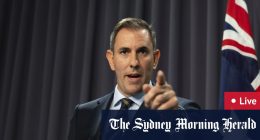
More babies will be harmed unless “systemic changes” are made to end the “defensive leadership” and unacceptable treatment of whistleblowers in the NHS, the health service ombudsman has warned in the wake of the Lucy Letby case.
Rob Behrens said there were “lots of similarities” between the spate of baby death scandals in recent years and the failure of executives at the Countess of Chester hospital to act on repeated concerns raised about the neonatal nurse.
Speaking in an exclusive interview with the Guardian, he said rapid changes must be made to England’s maternity and neonatal services or more babies would suffer.
Senior doctors on Letby’s unit repeatedly raised concerns about her link to the growing number of unexplained deaths. But it was not until early July 2016 that her appalling crimes were finally ended.
Health workers must be “able to raise patient safety issues” and the “tribal approach” between different professions such as doctors and nurses must be eradicated, Behrens said.
Dr Stephen Brearey, a consultant paediatrician who was the first to alert an executive to Letby’s connection to unusual deaths and collapses, has claimed there was an “anti-doctor agenda” among the hospital’s executive team, which, he said, explained partly why senior executives treated the consultants’ concerns as “a case of doctors picking on a nurse”.
Behrens said: “The Letby case is unusual and horrific and not representative of the intentions and actions of the overwhelming majority of dedicated NHS staff. That said, it raises questions yet again about a dysfunctional, adversarial culture in many NHS trusts, sub-optimal methods for reporting and investigating wrongdoing and unacceptable attitudes to whistleblowing and raising concerns.
“Although the appalling actions of Lucy Letby are extremely rare, unfortunately the culture of fear in NHS trusts is not isolated to this case. Leaders dismissing the concerns of staff is a pattern of behaviour that we see repeated across the NHS.
“Some still pay a heavy price for speaking up and this victimisation discourages others from coming forward. It is unacceptable and against the principles of what the NHS stands for.”
Behrens added: “The reality is that the picture across many maternity services in the NHS is bleak, and the evidence to support this keeps mounting. Maternity services have had more policy recommendations than any other health area and there have been recent, significant, and well-documented major service failures.”
Three major inquiries since 2015 have laid bare serious failures that led to babies being harmed or dying at the Morecambe Bay, Shrewsbury and Telford and East Kent NHS hospital trusts. A fourth inquiry, into the Nottingham hospital trust, is now under way.
Last week, the government announced a fifth inquiry, into how Letby was able to murder seven babies and attempt to kill six others. Pressure has been mounting from bereaved families and experts calling to strengthen the investigation to a statutory inquiry where witnesses would be compelled to give evidence.
Behrens has this week written to Steve Barclay, the health secretary, saying he supports the calls to upgrade it to a statutory inquiry.
He told the Guardian that despite the many inquiries into baby deaths in the NHS, there had been “insufficient change and implementation”, progress was too slow and patients remained in danger. “It is a tragic inevitability that until comprehensive, systemic changes to maternity care are taken seriously, more women and babies will be harmed.”
Behrens said he had identified four specific failures in the Letby case that matched patterns he had uncovered while investigating harm to patients in other NHS maternity and neonatal services.
“First, the trust leadership, both management and board were too defensive and more concerned about the reputation of their organisation than patient safety. Secondly, the board was insufficiently inquisitive or assertive and failed to show effective leadership at a critical time.
“Third, those clinicians who tried, repeatedly, to raise their concerns about the deaths were directly prevented from having the issues discussed, called troublemakers and threatened with disciplinary measures. Fourth, there was a reluctance to carry out serious incident reviews of the deaths and little or no appetite for commissioning wide-ranging independent reviews.”
People generally work in the NHS “because they want to help” and that “when things go wrong it is not intentional”, Behrens said. But the intended commitment to patient safety was often “undone” by a “defensive leadership culture across the NHS”.
While acknowledging some new NHS safety initiatives in recent years, including the creation of a specialist maternity investigation unit, he said there were “huge challenges still to be addressed”. There must also be a strategic review of the multiple public bodies tasked with patient safety so they are better coordinated and more accessible to the public.
Asked about the consequences if changes were not made, Behrens said: “Not only will families experience compounded harm, where those who have been harmed or bereaved are then subject to inadequate apologies, delayed responses, a lack of accountability and insufficient investigations, but at a systemic level, the harms and deaths will continue to happen.
“From what I have seen in casework over the years, if defensive leadership, which enables defensive cultures, is allowed to continue, more patients will be harmed and even die. We’ve seen it time and again in the various independent inquiries that have taken place.”
In a statement released after the Letby verdict, Dr Nigel Scawn, the medical director at the Countess of Chester hospital, said staff were devastated by what had happened and “committed to ensuring lessons continue to be learnt”.
“Since Lucy Letby worked at our hospital, we have made significant changes to our services. I want to provide reassurance that every patient who accesses our services can have confidence in the care they will receive,” he said.
An NHS England spokesperson said: “NHS guidance is clear, staff should be supported to raise concerns and that these are acted on. We have reminded NHS leaders about the importance of this following the verdict.
“It has updated its Freedom to Speak Up guidance, brought in extra background checks for board members to prevent directors involved in serious mismanagement from joining another NHS organisation, and now when NHS staff raise concerns, action can be taken and overseen by a non-executive who can use their independent role to hold the organisation to account.”
Read More: World News | Entertainment News | Celeb News
Guardian







